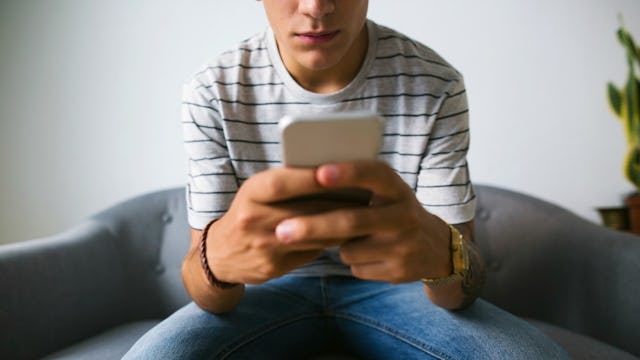Why It's Important To Remind Our Teens To 'Be Human'

The other day, I asked my son to respond to something “as a human.” As the words were coming out of my mouth, I then asked myself if my standards have gotten so low that asking him to do something that he obviously already does is what it has come to. In my opinion, in a world of social media and a teenage brain, it is something that does require being not only spoken, but taught.
I have been cautious about smartphones. I notice my own mood when on Facebook, and I have the advantage of working with teens and young adults as their therapist that I hear the impact other social media has on them.
I started paying attention a while ago when clients, unprovoked, would say they noticed a difference in their readiness to face the day in the morning when they removed Snapchat from their phone and they didn’t wake up to “stories.” I continued hearing about insecurities when they viewed pictures of friend groups. Mention these two words “friend group” to any teen and they will relate to that feeling of wanting to have one, and “everyone else (but me) has one they really like” based on pictures. This has guided my parenting.
The backstory is that two high school girls were in a physical fight. I remember seeing that at my son’s age. It was scary, overwhelming, and also something that was difficult to look away from. Will they be OK? Is someone going to intervene? What should I do now?
My son did not see the fight in person. Someone, actually a whole bunch of spectators, did what they know best. You are perhaps thinking how these kids who know “Don’t Be A Bystander” like it is tattooed on their body put a stop to it, but I am talking about the other thing they have ingrained into their brain.
They videoed it.
My son showed me the first video someone had sent out via Snapchat. I heard laughing in the background. That uncomfortable giggling you hear or maybe have done yourself when you don’t know what else to do, when you are overwhelmed and frozen. I also saw through the camera view a whole bunch of other cellphones being held up as if at a concert with everyone trying to capture the moment.
As I watched, I felt that same feeling from decades ago: scary, overwhelming, but also, as an older and wiser adult, I empathized knowing they will likely remember this moment forever. Will it be a trauma? How will they process all of these emotions?
I remember what I teach my clients: how trauma changes you, how what was once safe and predictable is now questioned. How will these teens, these kids, walk into this classroom again and feel safe? Feel confident? Feel secure? From a trauma perspective, it takes a while for the brain to shift from the fight/flight survival mode to the necessary executive functioning upper level brain activity required in the classroom.
I was pleased when my son said, “I will message her (the one he knows) to ask her if she is OK.” I could only hope that she knew it was sincere, and I acknowledged his courage and kindness in doing so. I thought about the story she was telling herself. All of her emotions, and I hoped she had someone wise to process it with. To learn from it. To heal. To grow.
The next day, after school, I asked in that mom-trying-to-be-nonchalant way, “So, were kids still talking about the fight?” He then showed me a slew of videos where kids had inserted captions and light sabers, and all sorts of clever things into the video. I grasped for meaning, and acknowledged to myself that perhaps it makes a disturbing event less overwhelming when you make it fictional and video-game-ish. But I just couldn’t smile and enjoy the entertainment. I found myself instructing my son to respond as a human. Be overwhelmed! Be scared! Be sad! But don’t be clever.
We keep reading and hearing how cellphones take the vulnerability away. Whenever one feels awkward, or alone, or insecure, instead of seeking out connection, being brave, and changing the outcome, one can spend hours avoiding those feelings simply by clicking on an app and playing a game. As recent as last month, The Today Show ran a segment on adolescents, their brain, and how it is possibly affected by screen time and extracurricular activities.
I see first-hand, as a therapist, how people look at phones to numb feelings and get a quick rush when one gets likes or views. I also see first-hand how resilient and authentic vulnerability can make people. When we don’t stop an uncomfortable feeling before it peaks and we let it get significant, even overwhelming, we can then survive it. And it dissipates. And we grow. Therefore, I will keep encouraging my kids to feel. Even when it is painful or embarrassing or lonely or distressing. They will learn to ride out the discomfort and come out stronger for the next time when their comfort is challenged.